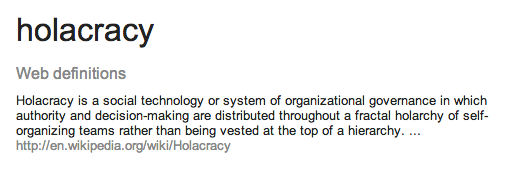13th May 2015
This thing called work, I just can’t handle it….
Who came up with idea that 5 days a week, and 40+ hours is the way ‘work’ should work? A lot of us grew up in the world where this was the norm. You ‘turned-up’ for work in a physical sense, and had to be seen to be working. In many ways, the quality of your work was as much about presence as it was about quality or quantity.
In case you haven’t noticed, things are beginning to change in a big way. Just spend some time working with millennials in any business that’s integrated into the networked economy, and you can see that the way ‘work’ is defined is undergoing a massive shift. Zappo’s in the US have been getting lots of profile around their concept of ‘Holocracy’, in effect doing away with supervisors and giving people more freedom to roam in and out of self-managed teams as the work requires.
The idea of a workplace – a defined physical space where work occurs is changing quickly. Not only in how it’s organised into defined zones (quiet work areas, hang-outs, meeting spaces), but in its purpose. Why do we think people have to be in a particular defined place for work to occur? Sure, it makes sense if you have a production line, or centralised assets that produce outputs, or a destination place like a bricks and mortar retail store. But in most cases for knowledge workers, the real assets and intellectual property resides in people, their relationships and an accessible drive in the cloud.
In our business we have offices in the established parts of Sydney, Melbourne and Auckland, but more and more they serve as a marker of our existence; as a place where our clients can meet with us or at times, just drop in and work, and as a place for our staff to meet, innovate and get aligned. The actual work we do could take place anywhere (and often does). It could be on a plane (as I write this), at home in the sun in my boardies, or at a client’s site.
We don’t need to look at each other to check up that we’re doing work. With viewable calendars and Dropbox, I can be anywhere and see who’s doing what with whom, and who’s creating and accessing work. It doesn’t really matter if that’s being done in our office in Queen St Auckland, or listening to a Queen song in a bar in Tokyo. I still get a buzz from walking out in Martin Place Sydney, and feeling the vibe and seeing the pace in peoples’ strides. There’s an energy and purpose that defines enterprise here – but I don’t need it everyday!
So where the work gets done is becoming irrelevant. So, what is it about the 5 days and 40+ hours that defines a career and productive output? It used to be seven days until religions influenced a day off for the Sabbath; it went to six and a half, and then six to allow more respite from what was often physical labour, and to provide more family time. Now I recognise that the rise of the casual workforce can produce inadequate earnings for some, but somewhere there is a notion to be embraced in the concept of a professional career. Why can’t someone build a successful career, make a great contribution and be an awesome leader of 3 or 4 days a week, in 30 hours? Why are we still (mostly) making women choose between motherhood and career as absolute choices? Surely we have to be more creative and change some of the mindsets we’ve created about work.
I’m suggesting we should challenge many of the out-dated notions of work today, particularly in larger organisations that might think staff have to be ‘captive’ in a workplace and overseen 5 days a week for work to be real. Telstra in Australia seem to have led the way to call all jobs flexible, and tech companies like Google and Apple have known this for a while (developers can cut the best code at 11pm on a lounge someplace listening to Beck). The war for talent is still on, and I can see organisations starting to embrace workplace flexibility in this area as a competitive employment proposition.
I think we’re on the verge of a revolution in how we define work, and how and where it gets done.
So what do you think? Do we need to push this harder and accelerate the pace of change in workplaces? I’d love to hear your views, and what you’re doing that redefines the traditional notions of work.
Glen Petersen
MD & CEO
Generator Talent Group
Categories: Uncategorised




